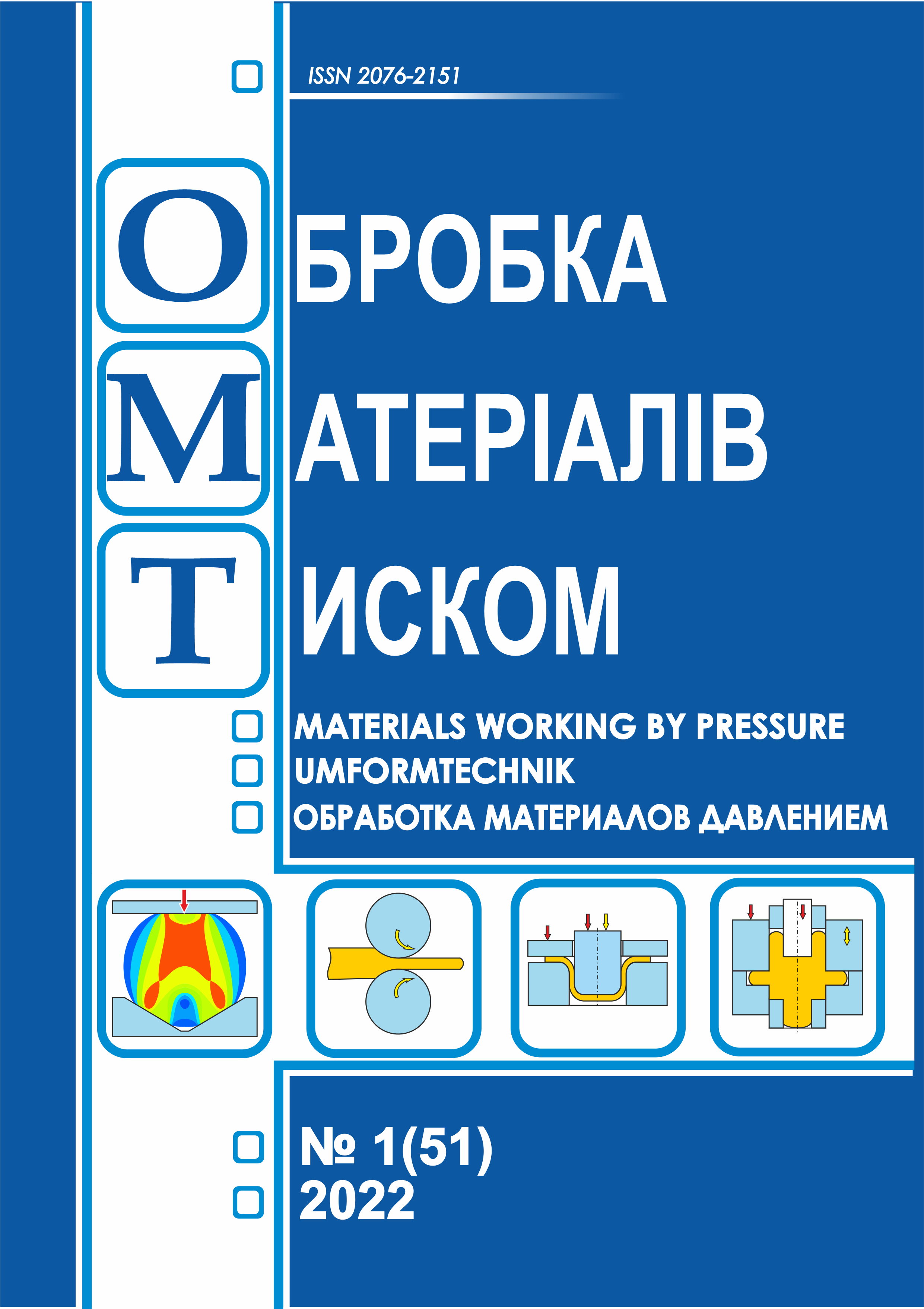The features of the precise forging processes by extrusion design based on energy calculation models
DOI:
https://doi.org/10.37142/2076-2151/2022-1(51)38Keywords:
precise forging, incorporated combined extrusion, kinematic module, power balance energy method, design, calculation model.Abstract
Hrudkina N., Levchenko V., Abhari P., Kotsiubivska K., Malii Kh. The features of the precise forging processes by extrusion design based on energy calculation models
The article demonstrates the possibilities of effective using the energy method of power balance for design of precise forging processes by extrusion. The classification of kinematic modules according to the main characteristics has been carried out, which increases the efficiency of their using at the stage of developing calculating schemes of the processes. The recommendations are given for rational using the unified kinematic modules, taking into account the limitations of their combination with adjacent kinematic modules, the possibility of varying the shape and location relative to the axis of symmetry. The base of unified kinematic modules of trapezoidal and triangular shapes has been expanded and recommendations in terms of rationality and limitations of their using at developing calculation schemes for the processes are given, taking into account operational configuration changing of the tool (presence or absence of chamfer and rounding). This made it possible to quickly control of complex-profile parts forming for the incorporated combined extrusion processes with several degrees of freedom of metal flow, which take place in self-regulating mode. A software module has been developed to systematize the base of unified kinematic modules, the components of their calculation and recommendations for using and the set of energy calculation models for the processes of precise forging by extrusion with prediction of the power mode and forming of the part. The promising directions for improving design of precise forging processes by extrusion based on energy calculation models are outlined, that will contribute to the introduction of incorporated combined extrusion processes in manufacturing.
References
Aliev I.S. Radial extrusion processes. Soviet Forging and Metal Stamping Technology (English Translation of Kuznechno-Shtampovochnoe Proizvodstvo). 1988. Part 3. pp. 54–61. ISSN: 0891-334x
Bhaduri A. Extrusion. In: Mechanical Properties and Working of Metals and Alloys. Springer Series in Materials Science. 2018. 264, pp. 599–646. DOI: https://doi.org/10.1007/978-981-10-7209-3_13
Aliieva L.I. Improvement of combined extrusion processes: monograph. Kramatorsk: LLC "Tiraj – 51". 2018. 352 p. ISBN 978-966-379-846-2. (in Russian).
Farhoumand A., Ebrahimi R. Analysis of forward–backward-radial extrusion process. Materials and Design. 2009. 30. 6, pp. 2152–2157. DOI: https://doi.org/10.1016/j.matdes.2008.08.025
Stepanskiy L.G. Calculations of metal forming processes. Moscow: Mechanical Engineering. 1979, 215 p. (in Russian).
Noh J., Hwang B.B., Le H.Y. Influence of Punch Face Angle and Reduction on Flow Mode in Backward and Combined Radial Backward Extrusion Process. Metals and Materials International. 2015, 21, 6, pp.1091–1100. DOI: https://doi.org/10.1007/s12540-015-5276-y
Choi H.J, Choi J.H., Hwang B.B. The forming characteristics of radial-backward extrusion. J Mater Process Technol. 2001, 113, pp. 141–147. DOI: https://doi.org/10.1016/S0924-0136(01)00703-8
Aliiev I., Aliieva L., Grudkina N., Zhbankov Ya. Prediction of the variation of the form in the processes of extrusion. Metallurgical and Mining Industry. 2011. 3(7), pp. 17–22. https://www.metaljournal.com.ua/assets/Uploads/attachments/17Aliiev.pdf
Hrudkina N., Aliieva L., Markov O., Kartamyshev D., Shevtsov S., Kuznetsov M. Modeling the process of radial-direct extrusion with expansion using a triangular kinematic module. Eastern-European Journal of Enterprise Technologies. 2020. 3/1 (105), pp. 17–22. DOI: https://doi.org/10.15587/1729-4061.2020.203989
Aliiev I.S., Nosakov A.A., Makhmudov K.D. The method of kinematic modules for the analysis of processes of precise forging. Improvement of processes and possession of vise processing in metallurgy and machine-building. Kramatorsk: DSEA. 2001, pp. 142–146. (in Russian).
Hrudkina N.S., Aliieva L.I., Malii K.V. Design of cold extrusion processes based on energy calculation modules. Materials Working by Pressure. Kramatorsk: DSEA. 2020. 1 (50), pp. 67–76. (in Russian).
Aliieva L., Hrudkina N., Aliiev I., Zhbankov I., Markov O.. Effect of the tool geometry on the force mode of the combined radial-direct extrusion with compression. Eastern-European Journal of Enterprise Technologies. Engineering technological systems. 2020. 2. 1 (104), pp. 15 –22. DOI: https://doi.org/10.15587/1729-4061.2020.198433
Aliieva L. I., Markov O. Y., Aliiev I. S., Hrudkina N. S., Levchenko V. N., Malii Kh. V. Analysis of power parameters of the combined three-direction extrusion process. FME Transactions. 2021. 49. 2, pp. 344–355. https://www.mas.bg.ac.rs/_media/istrazivanje/fme/vol49/2/9_oe_markov_et_al.pdf
Chang Y.S., Hwang B.B. A study on the forming characteristics of radial extrusions combined with forward extrusion. Transactions of Materials Processing. 2000. 9. 3, рр. 242–248.
Hrudkina N.S., Markov O.E., Shapoval A.A., Titov V.A., Aliiev I.S., Abhari P., Malii K.V. Mathematical and Computer Simulation for the Appearance of Dimple Defect by Cold Combined Extrusion. FME Transactions. 2022. 50. 1, pp. 90–98. DOI: https://doi.org/10.5937/fme2201090H
Hrudkina N. S., Aliieva L. I. Modeling of cold extrusion processes using kinematic trapezoidal modules. FME Transactions. 2020. 48. 2, рр. 357–363. DOI: https://doi.org/10.5937/fme2002357H
Aliieva L.I. Deformation of workpieces by the method of radial extrusion with counterpressure. Bulletin of KhNTU. Kherson, 2016. 2 (57), pp. 29–36. (in Russian).

